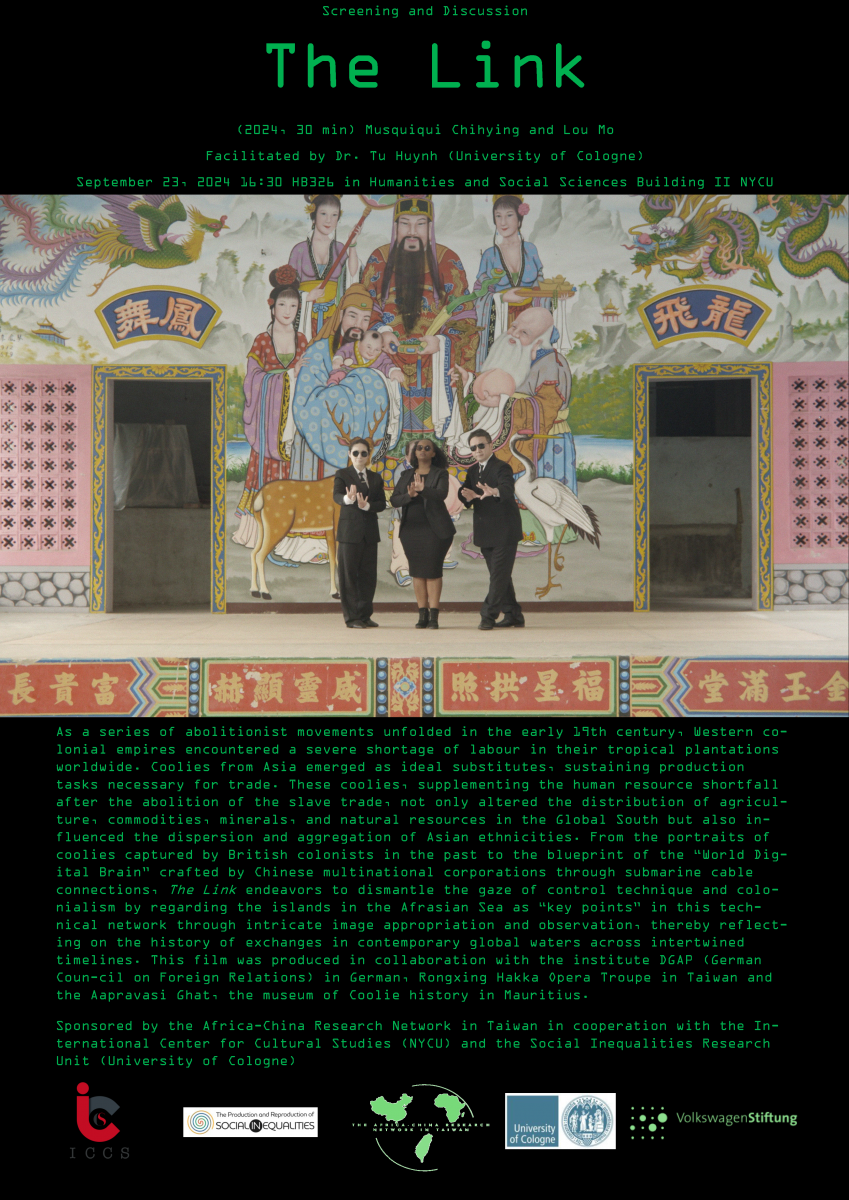
- This event has passed.
Screening and Discussion: The Link (2024) [Report]
September 23, 2024 @ 4:30 pm - 6:00 pm

Moderator: Tu Huynh (Associated researcher, Global South Studies Center, University of Cologne)
Director: Musquiqui Chihying (join virtually), and Lou Mo (join in person).
Language: English (Mandarin Interpretation provided in the post-screening discussion)
Sponsored by the Africa-China Research Network in Taiwan in cooperation with the International Centre for Cultural Studies (NYCU) and the Social Inequalities Research Unit ( University of Cologne).
This work is commissioned by The Hong Foundation.
Abstract
As a series of abolitionist movements unfolded in the early 19th century, Western colonial empires encountered a severe shortage of labour in their tropical plantations worldwide. Coolies from Asia emerged as ideal substitutes, sustaining production tasks necessary for trade. These coolies, supplementing the human resource shortfall after the abolition of the slave trade, not only altered the distribution of agriculture, commodities, minerals, and natural resources in the Global South but also influenced the dispersion and aggregation of Asian ethnicities. From the portraits of coolies captured by British colonists in the past to the blueprint of the “World Digital Brain” crafted by Chinese multinational corporations through submarine cable connections, The Link endeavors to dismantle the gaze of control technique and colonialism by regarding the islands in the Afrasian Sea as “key points” in this technical network through intricate image appropriation and observation, thereby reflecting on the history of exchanges in contemporary global waters across intertwined timelines. This film was produced in collaboration with the institute DGAP (German Council on Foreign Relations) in German, Rongxing Hakka Opera Troupe in Taiwan and the Aapravasi Ghat, the museum of Coolie history in Mauritius.
主持人: Tu Huynh (Associated Researcher, Global South Studies Center, University of Cologne)
導演:致穎 Musquiqui Chihying(線上蒞臨)、莫奴 Lou Mo(實體蒞臨)
語言:英語(映後座談提供中文同步翻譯)
本活動由台灣非中研究網路贊助舉辦,並由國立陽明交通大學文化研究國際中心、科隆大學社會不平等研究中心共同協辦。
本作品由洪建全基金會委託製作。
摘要
隨著19世紀初一系列廢奴運動的展開,西方殖民帝國在全球的熱帶種植園中遭遇了嚴重的勞動力短缺。來自亞洲的苦力成為理想的替代品,維持貿易所需的生產任務。這些苦力補足廢除奴隸貿易後的人力資源短缺,不僅改變了南半球農業、商品、礦產和自然資源的分佈,也影響了亞洲民族的分散和聚集。從昔日英國殖民者拍攝的苦力肖像,到中國跨國企業透過海底電纜連接打造的「世界數位大腦」藍圖,《鏈結》力圖透過以非亞洲之海的島嶼作為技術網絡中的「關鍵點」,進行複雜的圖像挪用與觀察,試圖瓦解控制技術和殖民主義的凝視,從而反映出當代全球水域在相互交織的時間軸上的交流歷史。此影片是與德國對外關係委員會研究所(DGAP)、台灣榮興客家劇團以及毛里求斯的苦力歷史博物館(Aapravasi Ghat)合製。
Event Info|https://iccs.chss.nycu.edu.tw/zh/activity.php?USN=1508
Event Photo|https://iccs.chss.nycu.edu.tw/zh/album.php?USN=306
Event Report
The Link is a short documentary directed by Musquiqui Chihying and Lou Mo. It explores the connections between migration, slavery, forced labor, extraction, and control techniques in the Global South, with a particular focus on Mauritius. The film also highlights the ties between the 19th century Western colonial period, and 21st century China’s “World Digital Brain” ambitions, as pursued by Chinese multinational corporations through submarine cable connections.
As a starting point, the film takes the audience to Aapravasi Ghat in the district of Port Louis. This site witnessed the British government’s use of cheap labor to replace slaves after the abolition of slavery. It served as an entry point where migrant laborers were profiled and photographed. They were checked individually and quarantined. Aapravasi Ghat was a place of control for migrant labor. This same mechanism is reflected in China’s “World Digital Brain” and its smart cities today.
“Making Mauritius a Smart Paradise for All” is a smart city campaign led by the Chinese company Huawei, which provides technology and services. The directors emphasized that just as the 19th-century British government used photography as a modern technology to profile and control migrant labor, today, similar camera ideologies are used to gather data and create algorithms for control. This information is transmitted through submarine cables; as Chihying stated, “Whoever controls the submarine cables will control the world.”
The film also traced migration history and uncovered the presence of Hakka people who had settled in Mauritius during the 19th century. However, not all Chinese migrants were brought by the British to work as coolies on plantations, and some came themselves as merchants in search of fortune.
The director, Musquiqui Chihying, stated that the film is in its preliminary stage and that he and Lou Mo will continue their project. This film was produced in collaboration with the DGAP (German Council on Foreign Relations), the Rongxing Hakka Opera Troupe in Taiwan, and Aapravasi Ghat, the Museum of Coolie History in Mauritius.
This showing was sponsored by the Africa-China Research Network in Taiwan in cooperation with the International Center for Cultural Studies (NYCU) and the Social Inequalities Research Unit at the University of Cologne.
The report is written by Aubrey Kandelila Fanani (IACS Master Programme)
